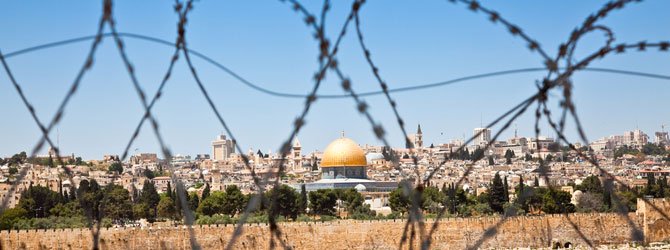-
Palestinian statehood and the UN
Palestinian statehood and the UN

In the second instalment in our series of guest expert opinion, former British Consul-General in Jerusalem, Sir Vincent Fean, considers questions of Palestinian statehood. He considers whether recognition of the Palestinian State can be a contributor to a peaceful outcome, or merely symbolic, and the best timing for such a move – as a precursor to negotiations, or after such negotiations have provided a tangible outcome?
Over 130 countries of the 193 United Nations (UN) members have recognised Palestine: two thirds of the UN membership, including India, China, Russia and Brazil. The latest to do so is Sweden, last October. What Palestine have they recognised? Arguably the one based on the pre-1967 borders (West Bank, Gaza and East Jerusalem). The vast majority of UN member states have – quite rightly – also recognised Israel, presumably on 78 per cent of Mandate Palestine – the Israel of pre-1967. I say presumably because for one state to recognise another, it does not need to recognise the borders of that other state. When the United Kingdom (UK) recognised Israel in 1950, the Government recognised neither the borders nor the capital – for us and for the world community, the status of Jerusalem remains to be determined in negotiations between Israelis and Palestinians, with the outcome to be endorsed by the UN Security Council.
While the UN Security Council is the prime mover at the UN, the UN General Assembly is where Palestine feels more at home, since it has the recognition of two thirds of the membership. In November 2012 the UN General Assembly voted to admit Palestine as a non-member observer state. As such, within the UN framework, Palestine is a state; able to join international conventions such as the 4th Geneva Convention, and non-UN bodies such as the International Criminal Court. That is exactly what Palestine is doing.
There is a Palestinian state to recognise now – a state based on the 1967 lines. The Palestinian Authority is the legitimate authority in both Gaza and the West Bank. There is no question of recognising Hamas, or Fatah, or any Palestinian faction, in recognising the state itself. Nor is recognition dependent on there being a particular political leader of Palestine – the UK recognises States, not governments. The British Government’s position is that “The Palestinian Authority largely fulfils criteria for UN membership, including statehood as far as the reality of the situation in the Occupied Palestinian Territories allows.”
The position of the UK and France on bilateral recognition is important, because these two nations helped to shape the countries of the region, and because we are both permanent members of the UN Security Council. Others watch what we do, and may emulate us.
In November 2011, the then Foreign Secretary said that negotiations are essential, and “This includes the Israeli Government being prepared to make a more decisive offer than any they have been willing to make in the past”. I leave you to judge whether Israel has made that decisive offer. Israel holds most of the cards in this essential negotiation: it controls all the borders save the Rafah crossing from Gaza into Egypt, it exerts military control, Palestinians cannot move without its permission, it controls the water supply and even the bandwidth in the Occupied Palestinian Territories, where 3G and 4G are banned on “security” grounds – except in the illegal Israeli settlements of the West Bank.
Is recognition of Palestine a constructive act, or symbolic?
Recognition is both constructive and symbolic. Let’s start with the impact on countries who are recognising Palestine, such as my own country, the UK. We say that we take human rights, and international humanitarian law, seriously. I believe that we do. By recognising Israel in 1950 we ascribed rights and responsibilities to Israel: the right to live in security and freedom, and the responsibility to conform to the international rule of law which the UK helped to create. Israel enjoys those rights, including the right to self-defence, and we uphold them. This is a question of rights, of equity under the law. The Palestinians have the same rights and responsibilities, and merit recognition on the same basis – in the clear expectation that they will conform with international law, and bear the consequences flowing from failure to do so. Recognition of Palestine alongside Israel brings us a sense of equity, enabling an even handed UK approach to resolving this conflict, and a definitive answer to those who accuse us of double standards in our treatment of Israelis and of Palestinians.
The impact on Palestinians is to give hope to those who believe that non-violence, respect for the law and international institutions, security, cooperation with Israel, and the principle of negotiations can deliver results despite today’s bitter realities. Recognition gives no succour to Hamas’s wrong and impossible doctrine of one state from the Mediterranean to the River Jordan – for how can our recognition of two states facilitate the single state outcome to which Hamas for their part, and some on the Israeli right for theirs, aspire? Recognition of both states is to bring a negotiated two state solution closer.
The impact on Israel is harder to assess. Arguably, recognition of Palestine on 1967 lines reinforces and complements recognition of Israel on 1967 lines. It does nothing to delegitimise the state of Israel – recognising the second state in the two state solution is not taking anything away that belongs to the first state. Rather, recognition levels the legal and political ground somewhat for the negotiations that must follow. It brings closer a just, equitable, negotiated outcome that enhances the security of both peoples – the only outcome that will last.
Recognition before or after successful negotiations?
Should we wait for the outcome of a successful negotiating process? I take the normative view – frequent attempts to achieve that essential negotiated solution have failed without UK recognition of Palestine. Why should our recognition now be responsible for the failure of a subsequent effort? We should do what is right, and uphold international law in so doing. Will recognition stimulate genuine negotiations? That depends on the parties. But there is one clear fact: both parties, and those who recognise Palestine, know that this act of itself will not end the Occupation which began in 1967. Only negotiations will do that.
I do not buy the argument that UK recognition will make the Palestinians disinclined to negotiate – I believe that President Abbas will negotiate, if the framework for those negotiations is fixed in a unanimous UN Security Council Resolution, based on past UN Security Council Resolutions – 242, 338, 1850 and 1860 – this last, UK sponsored Resolution brought a sadly temporary end to the Gaza conflict in 2009. We have witnessed two more Gaza conflicts since then. Only negotiations on a sound basis will prevent a fourth.
The future
Much depends on the outcome of two elections – Israel’s on 17 March and Britain’s on 7 May. I cherish two hopes: that the Israeli electorate will choose leaders who see the futility and danger to Israel of the illegal settler enterprise; and that the next British Government decides to recognise Palestine forthwith, in concert with France. I predict one more positive development: the UN Security Council this year will regain its rightful role as the means to address this conflict, by producing a unanimously agreed Resolution setting the framework for those essential negotiations. It is our best chance of negotiating a just, secure peace based on mutual respect and individual dignity. Meanwhile, recognition of both states in the Holy Land is our opportunity to regain our balance, according to Palestine in 2015, the same rights and responsibilities that we accorded to Israel 65 years ago.
This article is an adaptation of a recent speech, given by Sir Vincent Fean at the London School of Economics.

